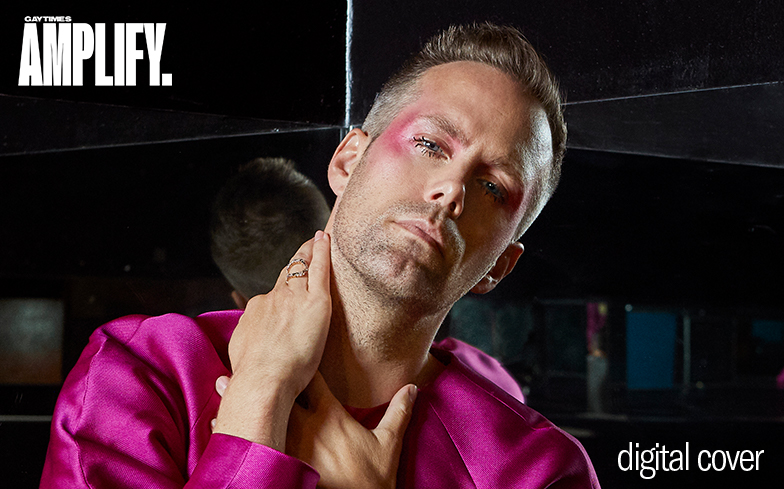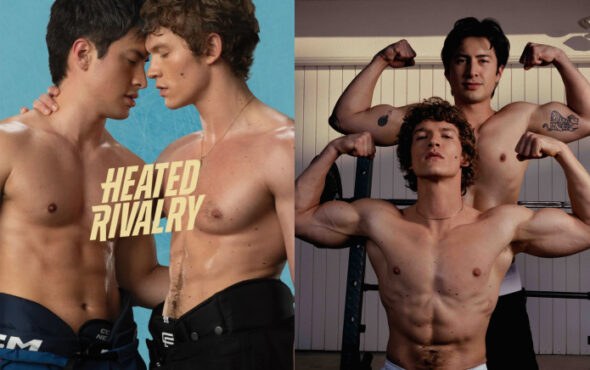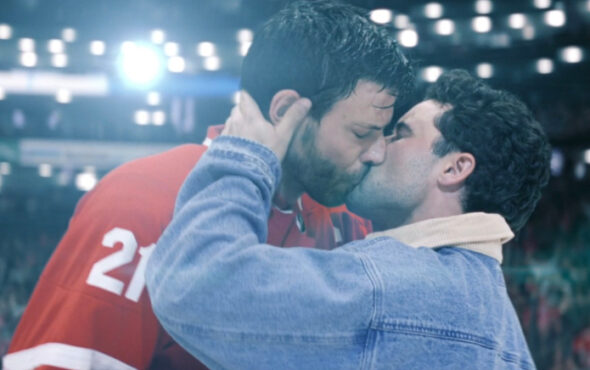
After fronting three albums with Semi Precious Weapons, the band who partied with Kate Moss and toured the world with Lady Gaga, queer artist Justin Tranter turned to songwriting, slowly becoming known as the go-to hitmaker for some of the biggest names in music.
Ariana Grande, Justin Bieber, Selena Gomez, Britney Spears, Gwen Stefani, Janelle Monae – you name a pop star, and Justin’s probably written a song for them. There’s something joyfully subversive about a queer, gender nonconforming wordsmith being a major voice behind the lyrics for straight chart-topping artists.
“I say all the time that there’s no reason for a songwriter to do press or to have an Instagram, because we aren’t the ones selling the songs,” Justin tells us, “but I do press, and I do have an Instagram, because I want young queer people to know that our queer ideas are mainstream as fuck. I think we’re going to get to a time when queer people are going to be able to tell their own stories and have them be huge hits, and between Sam Smith and Lil Nas X we are getting there. But I also feel pride in letting young queer people know that you don’t have to be the star if you don’t want to be, you can just make the music or you can just write the script. Those ideas are still valid. We can do all of it.”
With a number of new projects in the works, including TV shows and a musical that’s got Idina Menzel and Eve Ensler attached to it, we spoke to Justin to find out how they became one of the most in-demand songwriters of their time, what impact the coronavirus pandemic will have on the music industry, and what it was like working with the legendary Britney Spears.
I think like most gays of my generation, the first time I was introduced to you was when Semi Precious Weapons were on The Monster Ball Tour with Lady Gaga. How was that experience?
Well as you said, yeah, that is how most queer people were introduced to me and my band, through that tour. That experience was insane and amazing, we’re all still best friends even though the band’s been over for like six or seven years, we all still talk every day. I got to travel the world with my three best friends and play those amazing shows for those amazing audiences, it was mind-blowing and crazy. We all lost so much money but it was such a magical time. It was this amazing mind-fuck where our dreams were coming true but then we came home and we were all destitute… but it was worth every single second and every single penny.

Do you ever get an urge to go back to that lifestyle of performing and touring?
I definitely do not. My favourite thing about being a songwriter is that it’s not about me at all, it’s about me creating a space and a session and a song where the artist can feel safe and be their truest self and all of that shit. That’s so inspiring for me. I do sometimes miss getting to tell my own stories, but I’m finding other ways to do it, like I’m working on a TV project and a musical project right now. But no, I never get that itch to go back on tour and live that life again. It was amazing and I’m so glad I did it, but it’s exhausting!
You co-wrote Heal Me for the soundtrack of A Star Is Born, which the fans loved. I’m surprised you haven’t worked with Gaga more…
You know, Gaga is such an amazing writer on her own, and it’s a different type of thing; she’s always written most of her music by herself or with one producer, whereas the new school of pop is so collaborative – and neither way is better or worse – so in my world there’s like four people in every session. The way Gaga does it is very different, which is also amazing.
How did you make that transition from making your own music to writing for others? I imagine that was quite a big change for you.
It was quite a change. It happened when the band was promoting and working on our last album – we didn’t know it was going to be our last album at the time – and in that year and a half timeframe was when I met Katie Vinten, who’s now my business partner. The band had a publishing deal at Warner Chappell, and the guy who signed us had left, and the woman that came in to replace him was Katie, we were on our third record deal and it was getting all fucked up and everyone knew we were about to be dropped, and she said to me, ‘I don’t work at the label so I can’t really help your band right now, but I can put you in sessions to write with and for other people’. Her husband was a big fan of the band, and I was just sitting in LA waiting for the label to either drop us or release something, so I was like, ‘Well, I may as well just do this’. It was amazing. It was an accident in the sense that the opportunity was presented to me and I just said yes, but it was an accident I had to work my ass off for. If the band wasn’t touring, I was in at least seven sessions a week writing with and for other people. So it wasn’t this moment of, ‘Okay, I’m going to switch careers’, but a year and a half into it when another record deal and another business situation for the band wasn’t working out, I was just like, ‘Fuck it, I’m going to focus on songwriting because I haven’t had a hit yet but this feels good and it’s freeing to not have to think about what I’m going to say, or what the fans will think, or what this means for me as a person, I’m just going to focus on making the best songs possible and that’s all that matters in the moment’. So I dove headfirst into that, and I’m so glad I did because my whole life changed.
Who were your biggest songwriting inspirations when you were growing up?
I loved the singer-songwriters of the 90s like Tori Amos, Ani DiFranco, Paula Cole, Courtney Love and Gwen Stefani, and then behind the scenes, I worshipped Diane Warren and Linda Perry – and I still do. Basically, women that write songs have always been my driving force.

You do write with a lot of strong female pop artists, who the queer community have always been drawn towards. What keeps you coming back to them?
There’s something about feminine energy that is just so inspiring to me and I feel so safe in it. It’s such an honour to be allowed to help tell these feminine stories, and it’s what I relate to. I do have some amazing collaborations with men as well, but yeah, there’s something about a woman living her truth that really, really gets me going.
We’ve seen artists like Sam Smith and Lil Nas X top the charts, but even now it doesn’t feel like there are enough mainstream queer artists getting hits. Do you think that’s a problem the industry needs to work to overcome or is it down to the listeners?
There’s a lot that needs to happen. The executives need to not be afraid of it, because even though most of them probably consider themselves allies, I’ve definitely been privy to conversations of, ‘Yeah but that’s too this, or that’s too that’, or whatever it may be. So it’s an executive issue, it’s also a general public issue, and it’s also a queer community issue. I think some queer people – not all, of course – have internalised homophobia where we’re afraid to see ourselves sometimes, and we would prefer to see a straight cis woman act out queer culture instead. That’s not our fault, that comes from society telling us that we’re bad and wrong and that we need to do whatever the fuck society has told us for our whole lives. So I think that the issue comes from the industry, the issue comes from the general public, and the issue also comes from the queer community. We need to lift up our own people in this process.
What has your experience been like as a gender nonconforming artist in the music industry? Has it been mostly accepting?
It’s been… interesting. As an artist, I definitely faced a lot of extreme homophobia and femmephobia. It was a different time – our record deals were from 2008 to 2013 – and the press would say crazy things and executives would say crazy things, and I would have emails from record labels saying, ‘You need to edit out the bit at one minute and twenty-six seconds because Justin’s hand is way too feminine moving’, all these crazy things. As a songwriter, it happens less, but I will say that more doors were opened for me once I stopped dressing the way I did back then. Once I stopped showing up to everything in pantyhose and heels, more doors did open for me, and that’s a weird thing for me to process as a gender non-conforming queer person because it’s like, ‘My life changed when I looked more conforming, does that make me a sell-out?’ I wasn’t consciously dressing differently, it’s just… we all change. But it is a really hard thing to navigate, and I think it’ll take me about 10 years of distance to be able to answer that question correctly.

I’m a huge Britney Spears fan, so I have to ask what it was like working with her in the studio?
She is unbelievable. She’s such an amazing artist, she’s one of those people where you’re talking and hanging out, and she’s so sweet that you forget that it’s the megastar Britney, and then she gets on the microphone and that iconic vocal tone that just naturally falls out of her face perfectly, and you’re like, ‘Oh right, that’s fucking Britney Spears’. It’s awesome. She is everything you want her to be. She’s brilliant, she’s strong, she’s vulnerable, she knows who she is, she knows what she likes, she’s amazing.
Which song you’ve written do you wish was given the single treatment?
You’re asking a lot of questions I have never been asked before, which is rare these days! That is such a great question. You’ll have to give me a second, I’m gonna own this awkward pause because I want to answer this right. I will say, it’s probably not one you’ll be thinking of, it’s an Imagine Dragons song called Walking The Wire, that’s one of my favourites. I also know too that their lead singer Dan Reynolds – who’s like the king ally for our community – he and I are really close, and he shares that feeling with me too, like, ‘Fuck, we should’ve made that a single!’ I also really would’ve loved to see a video for Britney’s Do You Wanna Come Over.
I’m still bitter that it wasn’t a proper single.
Yeah, that one I would’ve loved to have seen a video for. Also, even though it was a single, I wish Janelle Monae’s Make Me Feel would’ve been top 10 on the radio for 20 years, because I love that song so much. I feel like the world didn’t give it the respect it deserved.
Out of all the songs you’ve written, what have you personally seen have the most impact on the world?
That is a very good question. Normally I just get, ‘What’s your favourite song you’ve written?’ and I’m like, ‘I don’t fucking know!’ [Laughs] I think doing Julia Michaels’ song Issues really connected to a lot of young people, being so confessional and honest about Julia’s issues, and that being a massive, massive hit is really powerful. I’m also super proud of Bad At Love, which I wrote with Halsey, and that’s because of the bisexual pronouns; she uses male pronouns in the first verse and female pronouns in the second verse, and that song was number two on American radio. To have a tumultuous, detailed, bisexual love song on the radio, that makes me super, super proud.
Have you been able to carry on writing and collaborating through this pandemic?
We’re not in studios of course, we’re not getting together to write songs because that would be selfish and stupid, but there are a couple of TV projects I’m working on where I’ve been able to write the scripts for those, and there’s a musical I’m working on where I’ve been able to do some creative thinking. It has been interesting for me, because I am just so angry at this country and angry at our healthcare system and angry at capitalism that it’s kind of hard for me to really think about pop music too much right now. I’m sure I’ll come back around, but right now I want to fight for what’s right and do the right thing with my money and help people. We always knew what was horrible about capitalism and the healthcare system in this country, we all knew it sucked, but now it’s so out in the open and I want to do everything I can to help make a change for the better. So it’s hard to think about music right now.
Finally, how do you think the coronavirus pandemic is going to affect the music industry going forwards?
I can only answer with what I want personally. This pandemic has definitely put a lot into perspective for me, and I only want to work on things that I truly love and truly think are doing good for the world. That doesn’t mean they have to be political – I would love them to be political, because political songs are my favourite – but I’m hoping that after this, we’ll get some real artistry and real musicianship rising to the top. I know for me during this, I’m listening to the classics, the real storytellers and the real musicians, that’s what I’m turning to for comfort and support, and I would love for the rest of the world to start leaning heavily into that too. But you know, it’s an interesting thing because everyone needs music for different reasons, so I don’t really feel comfortable saying what the music industry should do or should be after this, because everyone needs something different.
Photography Noah Webb



